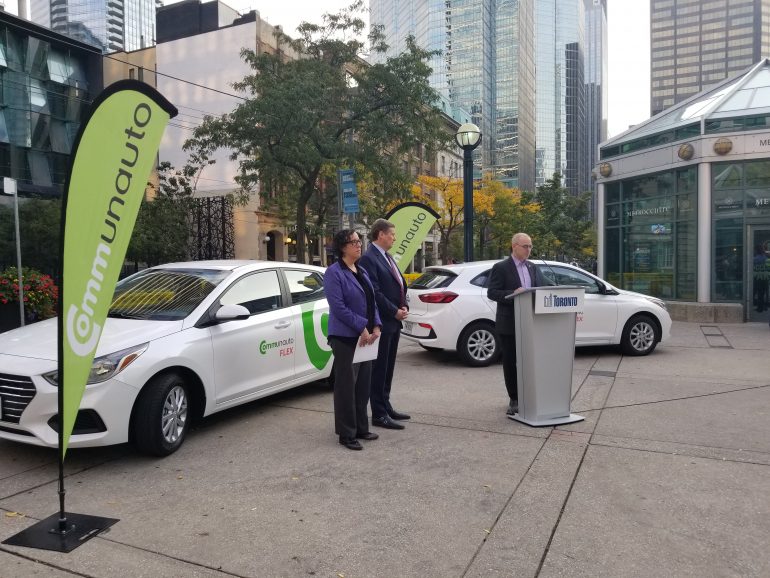Montreal-based Communauto has expanded to Toronto, making it the first free floating car service approved in a city pilot.
Announced this morning with Toronto mayor John Tory and Communauto president Benoit Robert, Communauto was the first to receive a permit from the city’s 18-month free-floating car share project which began in July.
Through the permit, up to 500 overnight on-street permits will be issued per car-share company for customers to park on permitted streets, with a cap of 2,000 permits. Permits cost $1,487.85 plus HST per vehicle, and streets at 95 percent for residential parking are excluded from reservation systems.
A car-share vehicle cannot be parked in any one place for more than two consecutive days.
“It’s that balance between neighbourhoods and carsharing programs.”
Communauto is the first free-floating carshare service to be approved under the pilot after Car2Go pulled out of the city in May, calling the city’s pilot conditions too restrictive, according to the CBC. The carsharing service indicated concern with the $1,500 fee per car.
According to the CBC, Car2Go wanted its users to be able to park its 350 shared vehicles in Toronto’s residential areas, and encouraged them to do so. This sparked outcry from residents already dealing with scarce parking space.
Following those concerns from Car2Go, City of Toronto transportation general manager Barbara Gray said the City revisited its pilot and did consultations with “many” carsharing companies. “One of the things that we found was that it was important to go back to the council with an ask to be able to allow them to park on streets that were 100 percent subscribed in permit parking areas, and we made a number of other tweaks to the program before we launched it as a pilot,” said Gray. “I think the further consultation that the council asked us to do was very helpful to make sure we could have a pilot that was attractive in a very short amount of time, and Communauto is here as a result of that.”
Tory called Car2Go’s decision to leave Toronto “unfortunate,” but indicated that it was still open to having its services operating in the city. “We’ve had some discussions with them since then and simply made clear that we as a city council, it’s that balance between neighbourhoods and carsharing. We made some changes to the program we felt were appropriate, and if they wanted to come back, of course they are welcome,” he said. “I think they’re accurately considering that, it’s fair to say… there’s room for three or four companies in the pilot period. The more the merrier.”
Speaking with BetaKit after the press conference, Robert said that the permits were actually one of the things the company looked for before entering the Toronto market. “The quality of the service cannot be as good as when you have a permit,” he said. “So the parameters to be able to launch a service with success is with access to permits at a reasonable price, and we do think the price in Toronto is still reasonable compared to other cities.”
Launched in 1994, Communauto already operates in Paris, Halifax, Montreal, Ottawa, Gatineau, Kingston, and Sherbrooke. During the course of the pilot—which will end up with 500 Communauto cars by the pilot’s end—Communauto will share anonymized data with the city related to distribution of usage, trips started and ended, and demand in order to assess the project’s efficacy.
“In other cities, there are constraints we don’t have to deal with in Toronto,” Robert said. “For example, in Montreal, they clean the streets every week. Sometimes twice a week in some areas, so we have to be careful that people don’t park cars in places where the streets will be cleaned soon. In Toronto, there are constraints like the no-clustering policy, but we know by experience that most of the car distributes quite evenly within the zone.”
This story is being updated with more information.


